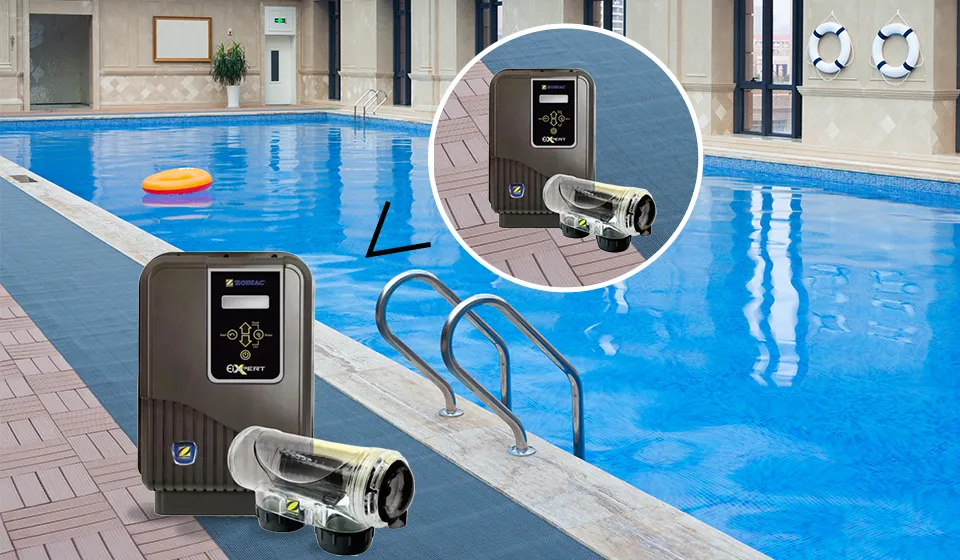If you want an easier way to keep your pool clean and safe, you might be thinking about using a salt water pool chlorinator. These devices can be a good choice for people who don’t have the time to check and adjust their pool’s chlorine levels daily. Once they are set up, they add the right amount of chlorine to your pool without much effort from you. This helps save time and can even lower your pool maintenance costs over time. Another significant benefit is that they keep the chlorine level steady, which is essential for keeping the water clean and healthy. If the device stops working, you might need to fix or replace it sooner than you would with manual chlorine methods. But before you decide, it’s essential to know both the good reasons for using one.
How Does a Swimming Pool Salt Chlorinator Work?
A salt water chlorinator for swimming pools turns salt into chlorine using a process called electrolysis. As the salty water flows through the salt chlorinator cell, it gets a small electric charge. This changes the salt (sodium chloride) into chlorine, which then cleans the pool by killing bacteria and algae. After cleaning the water, the chlorine turns back into salt, and the process starts again. Because this cycle keeps going, you don’t need to add chlorine by hand as often. This makes it easier to take care of your pool and can also help save money over time.
The Benefits of Using a Salt Water Pool Chlorinator
Keeping your pool clean and safe can take a lot of time and effort, especially when it comes to maintaining the right chlorine levels. A swimming pool salt chlorinator can make this task much easier.
- Improved Water Quality: One of the most significant advantages of using a pool chlorinator is that it helps maintain a steady and consistent level of chlorine in your pool water. This is important because it keeps the water clean, kills harmful bacteria and algae, and makes the pool safer for swimming.
- Cost-Effective: Since the chlorinator manages the chlorine levels automatically, you won’t need to buy and add as many chlorine tablets or liquid. Salt, which is used in salt water systems, is also more affordable than traditional chlorine products. Plus, by keeping your chlorine levels stable, a chlorinator can help protect your pool equipment and surfaces from damage.
- Convenience and Time-Saving: Manually checking and adding chlorine every day can be time-consuming, especially during the summer when your pool is used more often. A pool chlorinator takes care of this task for you. Once it is installed and set up, it works on its own, adding the right amount of chlorine as needed. This means you can spend more time enjoying your pool and less time worrying about maintenance.
- Less Risk of Human Error: When adding chlorine by hand, it’s easy to add too much or too little. This can lead to water that’s either unsafe or unpleasant. A chlorinator helps avoid these problems by giving you more accurate and reliable results.
Three Key Factors for the Right Salt Water Pool Chlorinator:
A salt water pool chlorinator can make pool maintenance much easier and more cost-effective. But with many options available, it’s essential to choose the right one for your pool. Here are three key things to consider when selecting a saltwater chlorinator that will give you the best performance and value.
- Pool’s Capacity: The size of your pool plays a big role in choosing the right chlorinator. Each saltwater chlorinator is designed to support a specific water volume. If the system is too small for your pool, it won’t produce enough chlorine to keep the water clean and safe. To avoid these problems, always check your pool’s capacity (measured in gallons or litres) and choose a chlorinator that matches it.
- Quality of the Electrolysis Cell: The electrolysis cell is the heart of any chlorinator for swimming pools. This is the part that turns salt into chlorine using electricity. A good salt water pool chlorinator cell ensures the system runs efficiently, lasts longer, and delivers steady chlorine levels. When shopping for a chlorinator, be sure to check what the cell is made of and how long it’s expected to last.
- Pool Design and Self-Cleaning Feature: Over time, minerals in the water—like calcium—can build up on the chlorinator’s cell. This can lower its efficiency and shorten its life. A self-cleaning chlorinator solves this problem by automatically switching the electrical flow inside the cell. This feature saves time and reduces the need for manual cleaning. A self-cleaning system works well with all kinds of pool designs, keeping your maintenance routine simple.
Conclusion
Pools with complex designs—such as curves, deep ends, attached spas, or water features—often need more accurate pump sizing. These features can add resistance to the pool’s design system, making it important to choose the right equipment. That’s why working with experienced pool builders in Albury is a smart choice. They can offer expert advice on selecting the best saltwater chlorinator and other equipment to match your pool’s unique design and how you plan to use it. Their knowledge helps improve energy efficiency, extend the life of your system, and ensure your pool runs smoothly. Make the right choice, and your pool will be a source of joy, not extra work!
